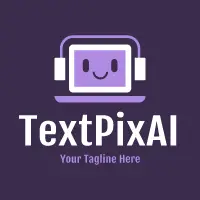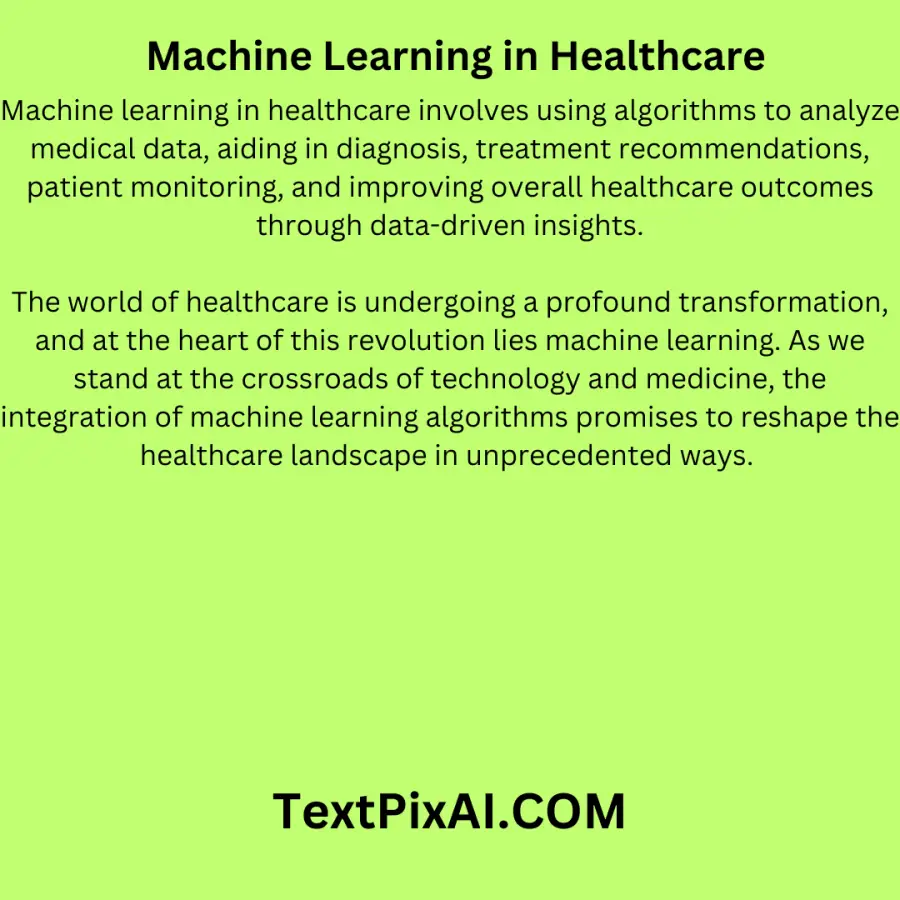Machine Learning in Healthcare
Introduction
The world of healthcare is undergoing a profound transformation, and at the heart of this revolution lies machine learning. As we stand at the crossroads of technology and medicine, the integration of machine learning algorithms promises to reshape the healthcare landscape in unprecedented ways. In this comprehensive guide, we embark on a journey to explore the remarkable impact of machine learning in healthcare, from disease diagnosis to drug discovery and beyond.
You may also like to read:
Physics-Informed Neural Networks
The Evolution of Healthcare and Machine Learning
A Historical Perspective
To understand the significance of machine learning in healthcare, it's essential to take a step back in time. The roots of this transformation can be traced to early applications of technology in medicine. From the invention of the X-ray machine to the development of electronic health records (EHRs), technology has been a driving force in healthcare for decades.
Machine Learning's Impact
However, it is in recent years that machine learning has truly come into its own within the healthcare sector. The ability to process vast amounts of data and derive meaningful insights from it has opened new horizons. Machine learning algorithms have become instrumental in supporting clinical decision-making, streamlining administrative tasks, and improving patient outcomes.
Understanding Machine Learning Basics
What Is Machine Learning?
At its core, machine learning is a subset of artificial intelligence (AI) that focuses on the development of algorithms capable of learning and making predictions from data. Unlike traditional programming, where explicit instructions are provided, machine learning algorithms learn from patterns and examples. This ability to generalize from data is what makes machine learning so powerful in healthcare applications.
Supervised, Unsupervised, and Reinforcement Learning
Machine learning encompasses various paradigms, each suited to different types of problems. Supervised learning involves training a model on labeled data, making it ideal for tasks like image classification and diagnosis. Unsupervised learning, on the other hand, seeks to discover patterns in unlabeled data, useful for clustering patients or identifying anomalies. Reinforcement learning, often associated with robotics, is increasingly relevant in healthcare for optimizing treatment plans and resource allocation.
Data Preprocessing in Healthcare
The quality of data is paramount in machine learning, especially in healthcare, where the stakes are high. Data preprocessing involves cleaning, structuring, and transforming raw healthcare data into a format suitable for analysis. However, healthcare data poses unique challenges, including missing values, noisy measurements, and data privacy concerns.
Applications of Machine Learning in Healthcare
The applications of machine learning in healthcare are as diverse as they are transformative. Let's explore some of the key domains where machine learning is making a significant impact:
Disease Diagnosis and Risk Prediction
Machine learning is at the forefront of early disease detection and risk assessment. Algorithms can analyze medical records, genetic data, and diagnostic images to identify patterns associated with diseases like cancer, diabetes, and cardiovascular disorders. By predicting disease onset or progression, healthcare providers can intervene proactively, potentially saving lives.
Treatment Personalization
Personalized medicine is a burgeoning field empowered by machine learning. Treatment plans tailored to an individual's genetic makeup, medical history, and lifestyle are becoming increasingly common. In oncology, for example, machine learning helps determine the most effective cancer therapies for each patient, minimizing side effects and optimizing outcomes.
Drug Discovery and Development
The process of discovering and developing new drugs is traditionally time-consuming and costly. Machine learning accelerates drug discovery by analyzing molecular structures, predicting drug-target interactions, and identifying potential drug candidates. This not only shortens development timelines but also offers promising avenues for addressing unmet medical needs.
Medical Imaging and Radiology
Medical imaging, a cornerstone of modern healthcare, has been revolutionized by machine learning. Deep learning algorithms can analyze X-rays, MRIs, CT scans, and histopathological images with remarkable accuracy. They assist radiologists in detecting abnormalities, such as tumors or fractures, at an early stage, improving diagnostic precision and patient care.
Electronic Health Records (EHRs)
Electronic Health Records (EHRs) have transformed the way patient data is managed and accessed. Machine learning algorithms are applied to EHRs to predict disease risk, recommend treatments, and optimize hospital operations. By harnessing the wealth of information in EHRs, healthcare providers can make data-driven decisions that enhance patient outcomes.
Challenges and Considerations
Despite the promising outlook, machine learning in healthcare faces several challenges and considerations:
Data Privacy and Security
The healthcare sector handles sensitive patient data, making data privacy and security paramount. Compliance with regulations such as the Health Insurance Portability and Accountability Act (HIPAA) is crucial. Machine learning models must be designed with robust security measures to protect patient confidentiality.
Interoperability
Healthcare systems often use disparate technologies and standards, leading to data silos and limited interoperability. Integrating machine learning solutions with existing healthcare IT infrastructure can be complex. Standardized data formats and interoperable systems are essential for seamless data exchange.
Ethical and Legal Issues
Machine learning algorithms can inadvertently perpetuate biases present in healthcare data, leading to disparities in treatment. Addressing algorithmic bias and ensuring fairness in healthcare AI models is a pressing concern. Moreover, questions of liability and accountability arise when decisions are influenced or made by machine learning algorithms.
Success Stories and Case Studies
The impact of machine learning in healthcare is best understood through real-world examples:
IBM Watson in Oncology
IBM Watson, known for its cognitive computing capabilities, has made significant contributions to oncology. By analyzing vast datasets of medical literature and patient records, Watson assists oncologists in treatment decisions. The result? More informed choices, better patient outcomes, and ongoing research insights.
Google Health's DeepMind
DeepMind, a subsidiary of Google Health, has leveraged machine learning to enhance medical imaging and diagnosis. Its algorithms have been applied to tasks such as detecting eye diseases from retinal scans and predicting patient deterioration based on vital signs. DeepMind collaborates with healthcare institutions to improve patient care.
Predictive Analytics at Cleveland Clinic
Cleveland Clinic, a leading healthcare provider, employs machine learning for predictive analytics. By leveraging patient data, including clinical notes, diagnostic tests, and genomics, the clinic can predict patient deterioration and allocate resources more efficiently. This proactive approach to healthcare saves lives and reduces costs.
Future Directions and Emerging Trends
As we look ahead, several exciting trends are shaping the future of machine learning in healthcare:
Explainable AI in Healthcare
The interpretability of machine learning models is critical, particularly in healthcare. Researchers are actively developing techniques to make AI models more transparent and interpretable. Explainable AI ensures that healthcare providers can understand and trust the recommendations made by machine learning algorithms.
Telemedicine and Remote Monitoring
Telemedicine, already on the rise, is benefiting from machine learning applications. Remote patient monitoring, aided by wearable devices and machine learning algorithms, enables healthcare providers to track patients' vital signs and health metrics in real time. This enhances patient care and extends healthcare access to remote areas.
AI-Enhanced Clinical Trials
Clinical trials, the cornerstone of drug development, are becoming more efficient with the integration of machine learning. AI algorithms aid in trial design, patient recruitment, and data analysis. By accelerating clinical trials, machine learning brings new treatments to patients faster and reduces research costs.
Tools and Frameworks
For those eager to explore the world of machine learning in healthcare, various tools and frameworks are at your disposal:
TensorFlow and PyTorch
TensorFlow and PyTorch, two of the most popular deep learning frameworks, provide robust platforms for implementing machine learning solutions in healthcare. These frameworks offer libraries and resources tailored to scientific and medical applications.
Healthcare-Specific Software
Numerous specialized software solutions cater to healthcare data analysis. These platforms facilitate the integration of machine learning into healthcare workflows, allowing healthcare professionals to harness the power of data-driven insights.
Conclusion
Machine learning's transformative influence on healthcare is undeniable. From early disease detection to personalized treatment and drug discovery, the potential for improving patient outcomes and streamlining healthcare operations is boundless. While challenges persist, the synergy between technology and medicine holds the promise of a healthier and more data-driven future.
References and Further Reading
For those seeking a deeper understanding of machine learning in healthcare, here are some valuable resources to explore:








